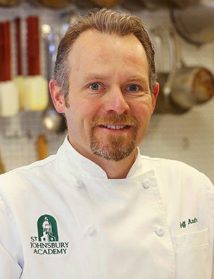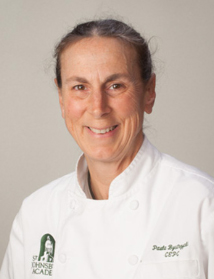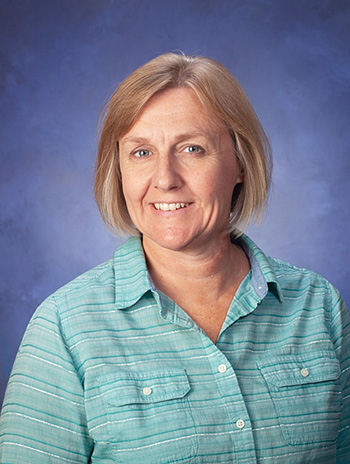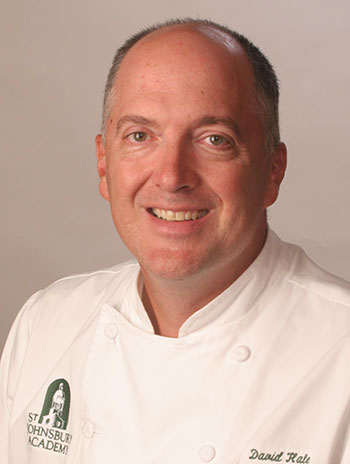Career and Technical Education
Hospitality and Tourism
Restaurants and Food/Beverages Services
Our culinary program focuses on our restaurant – The Hilltopper – where students learn all aspects of successfully running a restaurant. Students prepare and serve food, performing both front and back-of-house functions. In addition, our baking classes support the restaurant by preparing desserts.
Courses
Essential Cooking Skills
This cooking class covers the full range of student goals, from those learning to cook for themselves to those aspiring to a career in the hospitality profession. Working in a professional kitchen and the classroom, students will learn the foundations of cooking through a range of categories: cooking methods, soups and stocks, vegetable cookery, meats and fish, pastas and other starches, simple baking to include breads and desserts. Students will build skills while learning kitchen safety and sanitation. Students will be introduced to hospitality service through school functions and other public events.
Introduction to Baking and Pastry
This course is designed to educate students in the fundamentals of baking and pastries. Students will l earn basic baking techniques, desserts and pastries making, and cake decorating. Students will also learn kitchen safety and sanitation. The knowledge, skills, and hands-on project work will allow students the chance to explore what this industry might look like for a career path, small business, or employment opportunities.
Professional Baking and Pastry
This course is designed to educate students in the art of Baking and Pastry Arts. Students will learn the basics of mixing, shaping, and baking for several baked goods including quick breads, cakes, pastry doughs, mousses, sauces, glazes, cookies, candies, and confections. Plated desserts, international baked foods, chocolate work and decorated cakes are highlighted. In addition, students will be introduced to decorating techniques. Students will learn in a well-equipped, kitchen and prepare food for school functions and community service events. This course includes classroom instruction and practical lab work in a commercial kitchen. Students may retake this course as an advanced level course.
Hospitality Restaurant Management & Culinary Principles—Farm to Table
This class is taught in the Hilltopper Restaurant. Students in Restaurant Management/ Culinary Principles of Cooking learn entry level culinary skills needed for success in the foodservice industry or continuing education. Students train in industry-specific skills that can be used in all areas of the foodservice industry. Students will be introduced to Hospitality career pathways and an introduction to customer service and front of the house operations.
Students will focus on learning how to source and use local seasonal ingredients. This course will expose students to the importance of local agriculture and the importance of supporting the local agricultural economy.
Hospitality Restaurant Management & Culinary Principles — American Regional Cuisine
This class is taught in the Hilltopper Restaurant. Students in Restaurant Management/ Culinary Principles of Cooking learn entry level culinary skills needed for success in the foodservice industry or continuing education. Students train in industry-specific skills that can be used in all areas of the foodservice industry. Students will be introduced to Hospitality career pathways and an introduction to customer service and front of the house operations.
Students will learn the different regions of American Cuisine. The course will expose students to the diversity of ingredients, foods, and dishes of the United States of America. Also, students will learn the history of what, why and how the regions in America created signature cuisines.
Hospitality & Restaurant Operations Management and Advanced Culinary Techniques — International Flavors
This class is taught in the Hilltopper Restaurant. The program prepares students for entry-level careers in this high-demand industry. Hospitality & Restaurant Operations Management and Advanced Culinary Techniques encompasses the management, marketing and operations of restaurants and other food services.
Hospitality and tourism careers require an emphasis in hands-on experience. Students enrolled in the program can earn industry recognized certifications. The program also prepares students to pursue post-secondary education. Students in the program will apply their knowledge and skills in industry work experiences. This may include laboratory-based learning at the Hilltopper Restaurant, and possibly paid or unpaid work experiences for students in outside local establishments.
Students will learn about different international cuisines. The course will expose students to the diversity of ingredients, foods, and dishes in different parts of the world. Regions will include the Mediterranean, European, South America, and Middle Eastern Cuisine. Also, students will learn the history of what, why and how the regions created signature cuisines.
Career Opportunities
Career opportunities in hospitality and tourism span across various categories and skill levels, providing a wide range of options for individuals seeking employment in this industry. Here are descriptions of career opportunities in each of the specified categories.
Management Level
Catering and Banquets Manager: This role involves overseeing the planning, coordination, and execution of catering and banquet events, ensuring exceptional service, and managing the catering team.
Executive Chef: An executive chef is responsible for the overall culinary operations of a restaurant or hotel, including menu creation, food preparation, staff management, and ensuring high-quality cuisine.
Food and Beverage Manager: This position involves managing the food and beverage operations within a hotel, restaurant, or catering establishment, including overseeing menus, inventory, staff, and ensuring customer satisfaction.
General Manager: The general manager oversees all aspects of a hospitality establishment, including operations, financial management, staff supervision, customer service, and overall business performance.
Kitchen Manager: This role involves managing the kitchen operations, supervising kitchen staff, ensuring food safety and quality standards, and collaborating with other departments for smooth operations.
Maître d’: The maître d’ or head host/hostess is responsible for managing the front-of-house operations, including seating arrangements, guest reservations, and coordinating with the service staff to provide excellent customer service.
Restaurant Owner: As a restaurant owner, you would be responsible for all aspects of running a restaurant, including concept development, business planning, hiring and managing staff, ensuring profitability, and maintaining customer satisfaction.
Services Manager: This role entails overseeing various services within a hotel or resort, such as front desk operations, concierge services, guest relations, and managing guest feedback to ensure exceptional guest experiences.
Skill Level
Baker: Bakers specialize in preparing a variety of baked goods, including bread, pastries, cakes, and desserts, utilizing their expertise in mixing ingredients, baking techniques, and decoration.
Bartender: Bartenders mix and serve alcoholic and non-alcoholic beverages, engaging with customers, providing recommendations, and creating a welcoming atmosphere at the bar.
Brewer: A brewer is responsible for the production of beer, including selecting ingredients, managing fermentation processes, ensuring quality control, and maintaining brewery equipment.
Pastry and Specialty Chefs: Pastry chefs specialize in creating desserts, pastries, and baked goods, while specialty chefs excel in specific cuisines or techniques, such as sushi, barbecue, or molecular gastronomy.
Restaurant Server: Restaurant servers take orders, serve food and beverages, provide menu recommendations, and ensure guests have an enjoyable dining experience.
Wine Steward: Also known as a sommelier, a wine steward is an expert in wines, responsible for curating wine lists, providing recommendations, and assisting guests in choosing the right wine to complement their meals.
Entry Level
Banquet Server: Banquet servers assist in the setup, service, and cleanup of banquets and events, ensuring guests are attended to and catered to their needs.
Banquet Set-Up Employee: This role involves setting up tables, chairs, and other equipment for banquets and events, ensuring the venue is prepared and organized.
Bus Person: Bus persons clear tables, refill water glasses, reset tables, and assist servers in providing smooth service to restaurant guests.
Cocktail Server: Cocktail servers take orders and serve beverages, primarily focusing on alcoholic drinks, in bars, lounges, or restaurants.
Counter Server: Counter servers work in fast-food establishments or cafeterias, taking customer orders, assembling food, and handling cash transactions.
Host: Hosts greet and seat guests, manage waiting lists, coordinate reservations, and provide initial customer service in restaurants.
Kitchen Steward: Kitchen stewards are responsible for cleaning and maintaining the kitchen area, washing dishes, sanitizing utensils, and assisting chefs with food preparation.
Line Cook: Line cooks work under the supervision of chefs, preparing and cooking food according to recipes and ensuring timely and accurate plating.
Restaurant Server: Similar to the skill level position, entry-level restaurant servers take orders, serve food and beverages, and ensure guest satisfaction.
Room Service Attendant: Room service attendants deliver food and beverages to guest rooms in hotels, ensuring orders are accurate and providing excellent customer service.
Faculty

Jeffrey Andre
Culinary Arts Instructor
Jeff Andre teaches culinary arts through running the Hilltopper Restaurant alongside his students. Chef Andre has worked as a chef, executive chef, and has owned his own restaurant. He has also taught culinary arts at the college, high school, and middle school levels. Chef Andre received a BPS and AOS Degree in Culinary Arts Management from the Culinary Institute of America and also attended the U.S. Coast Guard Cooking School.

Paula Bystrzycki
Culinary Arts Instructor
Paula Bystrzycki has worked at St. Johnsbury Academy as a baking and culinary arts instructor since 2001. She and her classes provide desserts for the Hilltopper Restaurant. Chef Bystrzycki is also an advisor for the Academy’s Skills USA program, and her students have won either a gold or silver medal in the state Skills USA competition every year since 2003. She has also taken many students on to the national Skills USA competition where they have won many silver and gold medals and scholarship prizes to culinary schools. Chef Bystrzycki formerly worked as a pastry chef and an executive pastry chef. She holds ACF Executive Pastry Chef certification.
David Hale
Culinary Arts Instructor
David Hale joined St. Johnsbury in 2009. His prior experience includes Chef-Instructor, Executive Chef, and Director of Career Services at the New England Culinary Institute. He also worked as an executive chef in Napa Valley, California. Chef Hale received a BA from the University of Maine and an Associate’s Degree from the New England Culinary Institute.

Sue Libbey
Hospitality Instructor/Dining Room Manager
Sue Libbey joined St. Johnsbury Academy in 2003 and has worked in the Hilltopper Restaurant, instructing students in restaurant management, since that time. Sue is also a Skill USA Advisor in hospitality. She is certified in ServSafe and in Reading and Writing in Technology Education.


